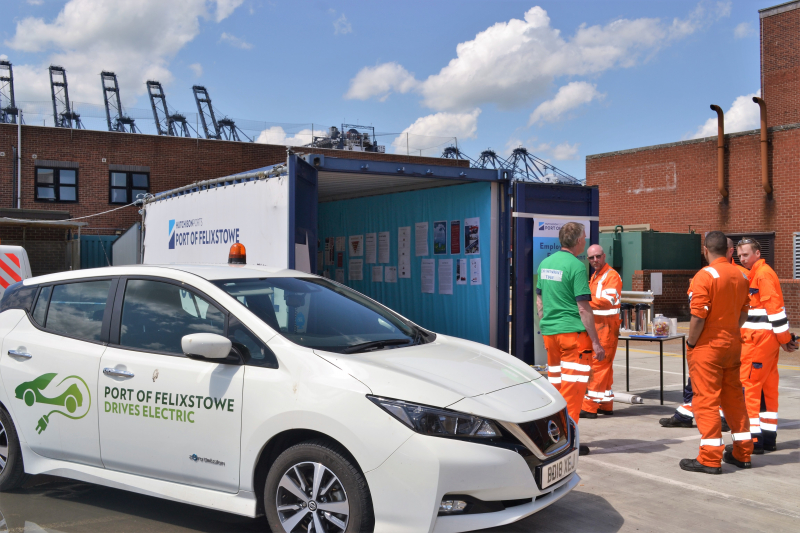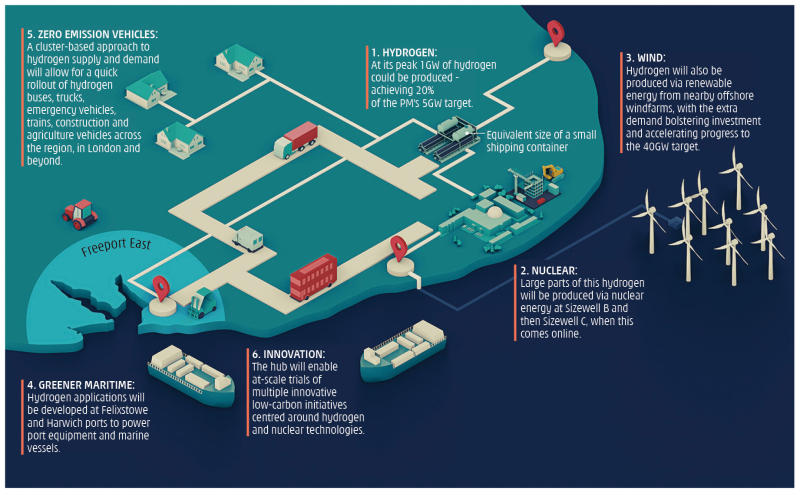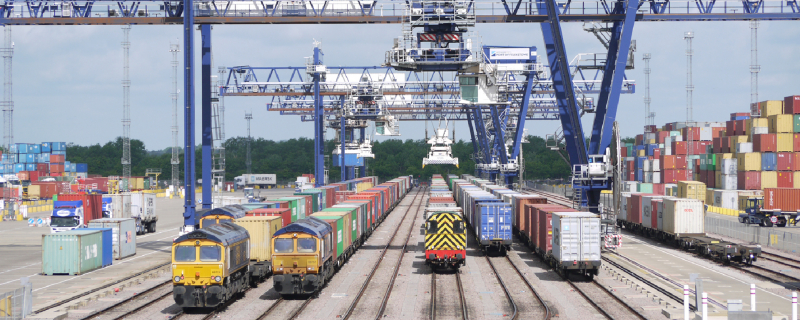Port of Felixstowe’s hydrogen revolution drives UK’s net zero goals
Hutchison Ports Port of Felixstowe has been chosen as an agent of economic transformation as one of the eight national freeports, Freeport East. It also has plans to become an agent of ecological change by transforming the local economy to run on emission-free hydrogen. Its plans for the future are uniquely ground-breaking, working to integrate the elements of a complex programme that includes economic, environmental and technological developments for years to come.
Centred around the use of emission-free hydrogen-based power, the transformation will begin from within. Only then will the Port of Felixstowe have the ability to encourage partners who come onto the site to make the change to hydrogen power. Then, the Port will be capable of supporting the adoption of hydrogen in the broader community beyond its boundaries. Each stage of development can be thought of as three distinct zones that the Port can influence as it blazes a new path. Then ports around the world could follow this pioneering example to support the health of the entire planet.


Zone 1: Transformation begins in your own heart
Zone 1 is within the Port itself and would be the starting point of hydrogen-based electrification. Port of Felixstowe vehicles used on-site will be replaced over time with electric vehicles (EVs). Larger equipment needs the extra power that hydrogen fuel cells can supply. The Port’s cranes, tractors and heavy forklifts are types of equipment that could be switched over to using hydrogen fuel cells. Establishing the recharging infrastructure for EVs and hydrogen supply for fuel cells for internal use would serve as the starting point to offer it to a wider user base.
Zone 2: Transform everyone you touch
Zone 2 transformation would be about integrating the hydrogen economy with partners who enter and leave the Port daily. Trucks, trains and ships are the main targets.
Over 4,000 trucks visit the Port of Felixstowe daily. As the UK moves forward with its Net Zero Strategy, many industrial sectors are under pressure to switch to low- or zero-emission power sources. Heavy trucking is on the list and as the Port increases its electric charging station and hydrogen refuelling infrastructure, it could become a major refuelling stop for truckers. A major barrier right now is cost, with hydrogen-powered options costing up to four times as much as traditional diesel vehicles. Prices are expected to come down, but the speed of this progress will impact heavily on adoption.
The rail industry is also changing, and implementing a mix of rail electrification and more future-oriented trains that have on-board hydrogen fuel cells. Track electrification and hydrogen fuel each have their own benefits and drawbacks, mostly related to range, the economics of infrastructure renovation, the cost of fuel and maintenance. With 38 freight trains pulling into the Port of Felixstowe every day, it has an opportunity to support their greening by providing power for return trips while loading and unloading are happening.
Ships coming to port have, in the past, burned their own fuel (normally diesel) to maintain power on board. Shore power from a green source could be preferable from an environmental perspective, but it means that both the Port and the ship (and by extension, the shipping industry) would have to invest to enable ships to connect. Right now, shore power is more expensive than burning diesel – but much cleaner. Measures are being undertaken to determine how the cost of shore power can be reduced to make this option more attractive for ship owners.
Centred around the use of emission-free hydrogen-based power, the transformation will begin from within.

Zone 3: Transform your community
By becoming a source of hydrogen power for fuel cells and powering vehicles, the Port of Felixstowe can begin to work with local power distributors to bring the hydrogen revolution to businesses and homes in the surrounding community. As Freeport East, it is expected that new business will be drawn to the area in the industrial, transport and logistics sectors. New investment drawing on green power sources with Felixstowe at their heart could be a positive step towards helping the UK reach its Net Zero goals.
The Port is in discussion with partners such as EDF, which operates a nuclear power plant at Sizewell near the Port, about the provision of electricity needed for hydrogen generation. Nuclear power plants operate most efficiently when they have a steady output that doesn’t go up and down with hourly demand. During periods of low demand, the plants can devote energy to a port-situated hydrogen production plant. These plants do not take up an undue amount of space and can easily be accommodated within the Port of Felixstowe’s premises. EDF will be opening a new nuclear power plant to replace an older, soon-to-be decommissioned plant, and will be part of the Port of Felixstowe plan for a greener future.
A joint study between the Port of Felixstowe and the University of Cranfield will determine the finer points of how research and commercialisation will be impacted by the complex factors at play: economic, technological, investment and return on investment and, of course, environmental. Hutchison Ports Port of Felixstowe is committed to moving forward to bring the UK closer to its Net Zero Strategy goals and lead by example to show how ports can not only transform themselves but also local communities for a greener world.
The Port of Felixstowe will bring the hydrogen revolution to businesses and homes in the surrounding community.